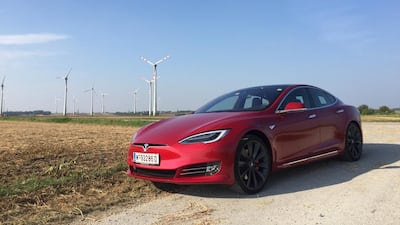Tesla deliveries are flatlining amid persistent production ssetbacks, reinforcing concern that Elon Musk may again be setting targets that his electric-car company will not hit on time.
The maker of Model S saloons and Model X 4x4s has reported quarter-by-quarter shipment declines for the second time in the past year. In addition to stoking fear about whether demand has peaked, these figures cast doubt on whether Mr Musk can pull off a steep production ramp for his most ambitious offering yet, the cheaper Model 3 saloon.
“Tesla’s Q2 production and deliveries report raised more questions than answers, particularly about Model S and X demand,” said Toni Sacconaghi, a Sanford C Bernstein analyst. “The Tesla investment thesis hinges on the success of Model 3, and the ability for the company to ramp production, make the car profitably and deliver good initial build quality.”
Mr Musk has a history of setting aggressive goals and timelines for Tesla and coming up short, including his calls for how soon the Model X 4x4 and less-expensive Model 3 saloon would follow the company’s top-selling Model S. His latest target - producing the Model 3 at a rate of 20,000 cars per month in December -- reinforces the challenge ahead. That’s nearly as many vehicles as the company has delivered quarterly over the last year.
Tesla plunged 7.5 per cent Wednesday to US$326.33, the steepest one-day decline since June 2016. After the market closed on Monday, the company reported more than 22,000 vehicle deliveries in the second quarter, down from 25,051 in the first three months of the year.
Demand for Tesla’s higher-priced Model S saloons and Model X 4x4s appears to be plateauing, said analysts at Goldman Sachs and KeyBanc Capital Markets. Mr Musk is relying on appetite for those vehicles remaining strong as the California-based company spends heavily to bring out the Model 3. Tesla plans to hand over the keys to about 30 Model 3 customers on July 28.
“While it is nice to see Tesla finally hit a stated target on time, we question whether 30 vehicle deliveries essentially built by hand count as ‘mass production,’” said Jeff Osborne of Cowen. “We also are surprised that this ‘mass market’ vehicle does not have official photos, options, pricing or really any details available.”
Goldman Sachs cut its six-month price target for Tesla stock by $10, to $180. Eight analysts rate the shares a buy, 10 recommend holding and six suggest selling.
In the statement released after the close of trading Monday, Tesla did not disclose the number of cars in transit, a departure from previous reports. Deliveries were impacted by production issues with 100 kWh batteries, according to the company.
Tesla first introduced the 100 kWh battery, which has a US estimated range of 335 miles, last fall. The company has been shifting the cell chemistry of its latest packs to using more silicon rather than graphite, Mr Musk said at the time. This swap allows the batteries to pack more energy within the same volume, Mr Osborne said.
Second-half Model S and Model X deliveries are expected to exceed first-half sales “provided global economic conditions do not worsen considerably”, Tesla said on Monday. The caveat raised eyebrows for some analysts.
“Typically, Tesla’s delivery forecasts are not conditional-- why now?” Mr Sacconaghi said. “Is the company worried about any specific macroeconomic headwinds? Is it fully confident in its orders?”
* Bloomberg

